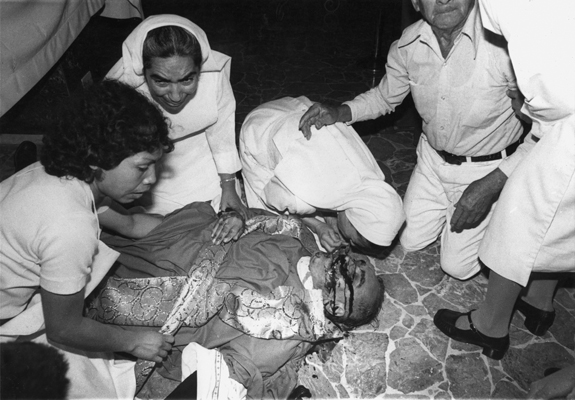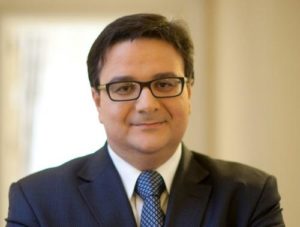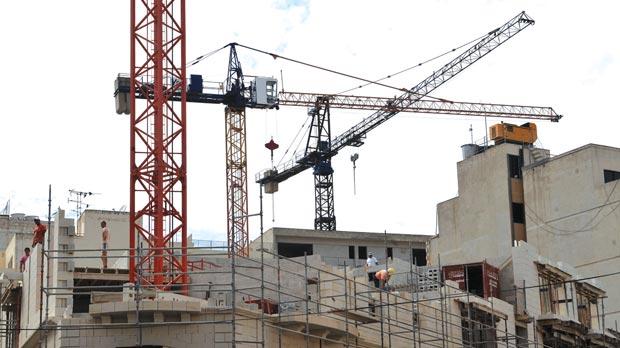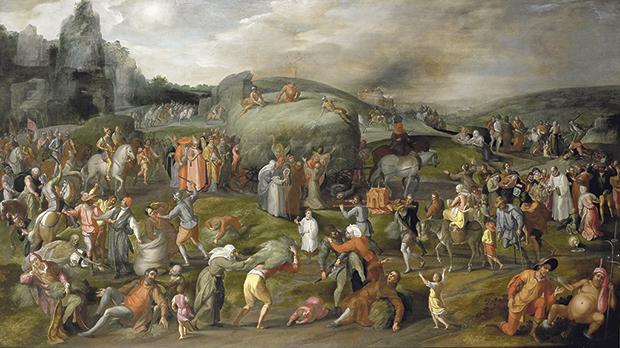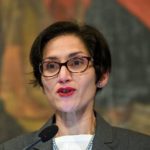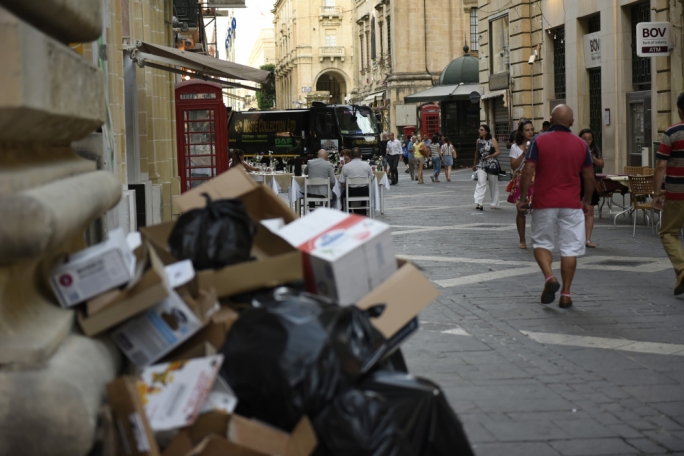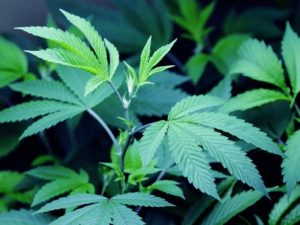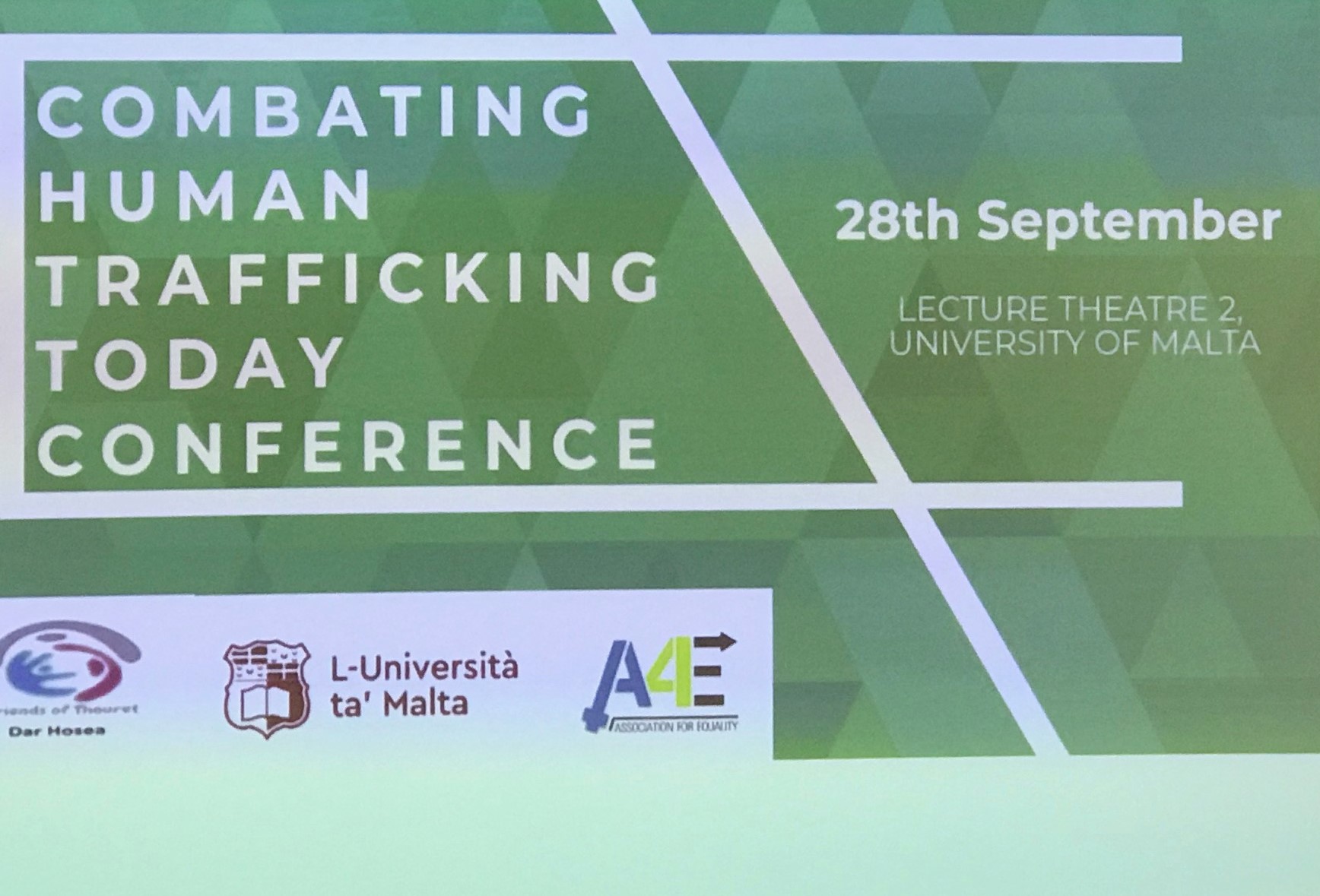
Combating Human Trafficking Today – Taking stock of evidence-based research and sharing experiences from Europe
Report on a Conference held at the University of Malta organised by the Association for Equality, the Centre for Labour Studies at the University of Malta and Dar Hosea by Tonio Fenech for Catholic Voices Malta
Dr Anna Borg representing the Association for Equality introduced the conference objectives and talked about the link between human trafficking and prostitution. According to the ILO 99% of all victims of human trafficking for the purpose of sex work are women, the other 1% are children, transgender persons and gays. These women are generally forced through violence, coercion or deception. Dr Borg noted that unfortunately we do not have any figures for Malta however when on looks at EU Reports on the subject, say in the Netherlands who was one of the first countries to legalise prostitution 60 to 70% of prostitutes claimed to have been forced into the activity.
Dr Borg asserted that human trafficking is demand driven and therefore if you create more demand for “sex services” you will create a demand for human trafficking.
Hon Julia Farrugia Portelli, Parliamentary Secretary for Reforms spoke about the importance of combating human trafficking. She described human trafficking as an illness or a plague and the need that we give hope to victims. She claimed that the Government was determined to address this issue. She however also mentions that there are other areas of human trafficking that need to be address as in Malta three fourths of human trafficking relates to employment with particular mention to domestic servitude.
When however, combatting prostitution Hon. Farrugia claimed that every model has its pros and cons making reference to both the Nordic Model and the New Zealand Model. She therefore stated that Malta needs to create its own model. She claimed that the objective of any such legislation should be to eradicate human trafficking and support victims, without necessarily distinguishing amongst gender. She also spoke of the efforts that the Police have taken address Massage Parlours and Gentlemen’s Clubs.
SESSION 1
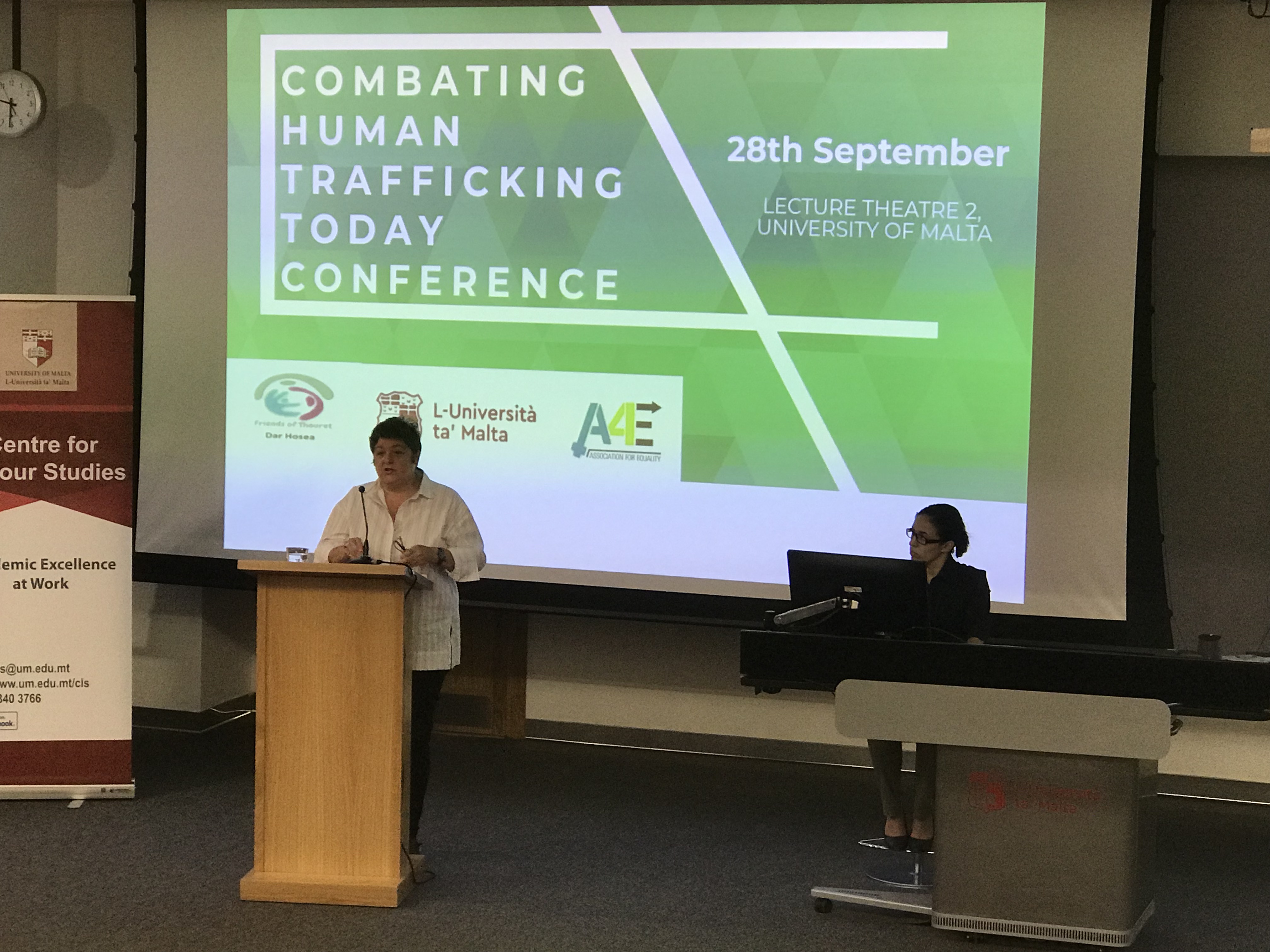
Ms Julie Bindel a journalist, broadcaster and writer, author of the book The Pimping of Prostitution: Abolishing the Sex Work Myth spoke how the so called sex industry sought to make prostitution look anything but trafficking, marketing it as enjoyable, empowering and liberating for the woman that is actually being abused. There may be the exceptions of women who want to have sex for money, and we are not here to stop such women, but legislation can never rely on a minority.
There are also those who try and make a distinction between legalisation and decriminalization. Ms. Bindel claims that there may be some legal differences but they are in fact closely linked and both offer the same negative impact on women, indeed failed experiments.
Ms. Bindel made it clear that no person who is selling sex should be criminalized, today we still see women who are the abused, the victims arrested while the John (persons buying sex) and the pimps untouched. The she claimed is an aberration. Ms. Bindel also claimed that she uses less the word human trafficking as not all prostitution is trafficking, and as trafficking is a process by which international and local pimps transport women to the places of prostitution.
She also asserted that trafficking would not exist if our countries would not have a vibrant sex industry. When we normalized regimes (i.e. legalise or decriminalise prostitution) trafficking grows as demand grows and it becomes no longer a law enforcement issue.
New Zealand has been claimed by some to be the way to follow in decriminalising prostitution. The facts however show a very different picture; more women are in fact on the street, figures show that they have quadrupled.
When legalized prostitution makes a bigger disaster when the Netherlands decided to legalized prostitution in the year 2000, they used the same arguments that the New Zealand Government used, and other Governments looking in the same direction use. Governments promise this will eliminate the underground trade and sex workers will operate in a safer environment, eliminate under age sex, drugs, tackle or eliminate the pimps, reduce HIV and make Johns better behave better.
In reality this did not happen, today even the Dutch Authorities are starting to accept that the model failed. Looking through the brothels windows in Holland once only sees Africans and Romanians, can one really believe that these came out of their own steam? That they have not been trafficked? Why is it that Dutch prostitutes are so rare that when there is a Dutch prostitute they actually place a sticker on the window with the initials NL to promote this rare occurrence.
Legalisation get rids of the pimps because it calls them Managers, trafficked prostitutes are called migrant sex workers and the Johns are called clients. When the clients rape the sex worker then it is no longer a crime but a breach of contract. Has in fact the reality of abuse changed? And if sex work is a “Job” why do we need exit strategies? asks Bindel.
When Holland legalised prostitution it created specific zones and also created a Union to sell the idea that sex workers were protected, Government gave it money to do research on how well the system was working. It its height of membership had it only represented 100 individuals from the 25,000 prostitutes on the streets.
The situation became so bad that the Mayor of Amsterdam decided to abolish the zones that had been created as he acknowledged that the reverse of what was promised had happened.
 Bindel focused on the Old Red Light District in Utrecht in the Netherlands where prostitutes can operate from 7am to 7pm under police monitoring and social workers who distribute condoms and in Bindles words “stitch beaten women up and sent back to the street”.
Bindel focused on the Old Red Light District in Utrecht in the Netherlands where prostitutes can operate from 7am to 7pm under police monitoring and social workers who distribute condoms and in Bindles words “stitch beaten women up and sent back to the street”.
The place is made of performance boxes for having sex. When Bindle interviewed the prostitutes in the zone they all wanted to leave but had no idea how and what to do as there were no exit programs. A system of sex oppression. A Policeman man had gone so far as to tell Bindle that they were considering painting the boxes is different colours so when the women reported to be abused, or raped they could trace the box and seek to pick the DNA of the men (if indeed possible). This place has also been closed by the Mayor of Utrecht due to the increase in human trafficking. The question however remains who is helping the woman?
In Nuremberg, Germany the Government boasts of exit programs. In reality Germany is the Mecca of brothels that take up to 600 men, offered “all inclusive” services that include beer and many women they desire for Euro 60.
Those that argue that it is the right of the woman to choose what to do with her body for legalising position are only using the woman as a human shield.
Bindle dispelled the myths of the New Zealand which uses the word decriminalisation stating that its effects where no different to legalization and effectively introduced the concept of brothels of up to 4 prostitutes that requited no licence, and this increased significantly their proliferation. Factually rapes and murders related to street prostitution increased, and by far outdid the countries with the Nordic Model put together. Because now it is deregulated there is no support for the women that are trapped.
Bindel’s appeal to Malta is to tackle the men running the industry and adopt ta version of the Nordic model and make Malta a no go area for traffickers.
The discussion “Prostitution and Trafficking – can they be tackled separately” was moderated by Ms. Helen Burrows UK Top 100 Slavery Influencer.
Ms Burrows through the question how Malta a Catholic country was still legging in the protection of women from prostitution and had not yet adopted the Nordic Model.
Ms Julie Bindel made the point that a secularist she worked with many people of faith who worked with the victims of prostitution. This she asserted is an issue of women’s equality with men, and that prostitution remained a beacon of the inequality.
Dr Katrine Vella, from the JRS spoke about the reality of young women forced or induced to make the journey promised work and a future and along the way are abused and trapped into prostitution. The experience leaves the girls so traumatised that they feel that now they are not good for marriage and that therefore there is no future for them other than prostitution. It is not enough to fight prostitution as an activity without offering women the support and shelter they need.
Inspector Joseph Busuttil spoke about the difficulties that the force finds in prosecuting Pimps as prostitutes are afraid to speak out. He also spoke at the changes in legislation to make harsher penalties and that they are on a number of cases that they hope to conclude and arraign people shortly.
The audience mentioned situations where prostitutes in the night have nowhere to go when police stop them loitering and they are afraid to go back to the Pimp without money.
It was also questioned how serious was law enforcement about fighting this issue of there was not prosecution of human trafficking in 6 years.
SESSION 2
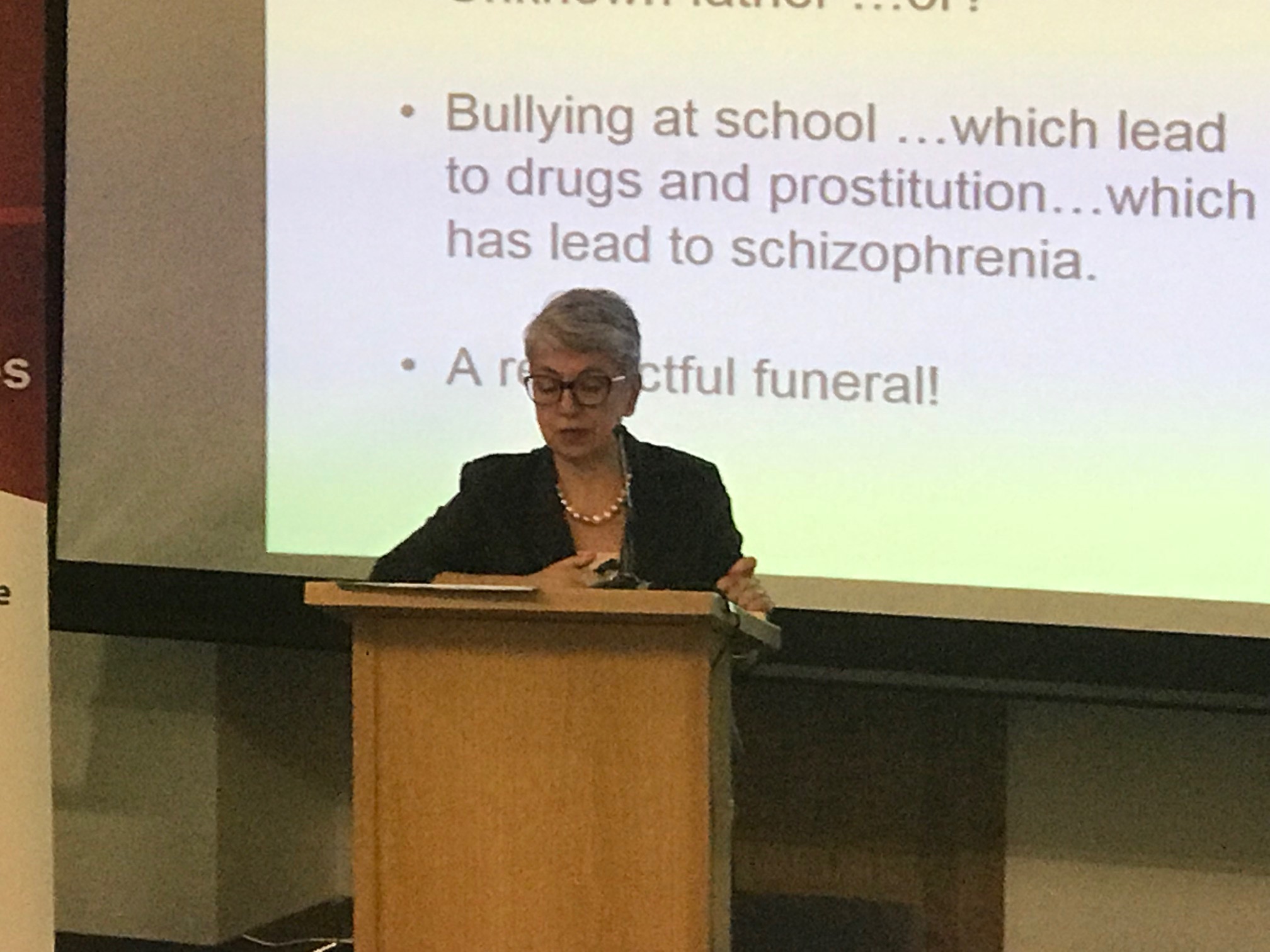 Dr Anna Vella from Dar Hosea focused her contribution on the real stories of prostitutes and their life of abuse. Michelle a woman that Dr Vella had been following since she was 17 years old and would go to her office to draw with crayons. Her mother, herself a prostitute, who introduced her to prostitution, calling her a dirty girl because she did not clean herself after being used by man as a child and before going to school.
Dr Anna Vella from Dar Hosea focused her contribution on the real stories of prostitutes and their life of abuse. Michelle a woman that Dr Vella had been following since she was 17 years old and would go to her office to draw with crayons. Her mother, herself a prostitute, who introduced her to prostitution, calling her a dirty girl because she did not clean herself after being used by man as a child and before going to school.
She always wanted to know her father and once her mother identified him to her at a bar. She approached her and he took her in a secluded place simply to rape her. At 40 she was in and out of Mount Carmel hospital with schizophrenia. Amazingly when her father died, and she discovered he was going to be buried without a funeral, she promised the hospital authorities to get the money in 24 hours, making €700 to give her father who she only met once, and who raped her a dignified funeral.
Many prostitutes start because of abuse or grooming from their own families. Do these women have a choice? asks Dr Vella. Caroline was thought to be a prostitute by her grandmother and was pimped by her father. How can we judge these people and understand their world? They never choose freely, and when you speak to them they tell you that they were coerced, forced and groomed.
Donna had a new pimp who Dr Vella knew he was a criminal. When she asked him why is she with him, Donna replied “because he feeds me and gives me a bed”. Soon he started also giving her drugs until she nearly killed herself when hitting wrongly an artery and fainted bleeding to death. Her pimp was in the house and saved her life but that night still wanted her to work. She was so abused that Donna at some point wanted to leave and Dr Vella helped her negotiate and exit ransom of €50 a day for 6 months. In reality today she is with another partner / pimp as she sees no other way to live.
Through the Daphne project, the research team tried to identify whether what led these women to prostitution was drugs or prostitution itself. Research showed that it was none of the two, it was in fact childhood sex abuse.
Dar Hosea is the Church response to support prostitutes that seek help and give them shelter. When Donna came to Dar Hosea for the first time and we offered her coffee she was astonished that it was free as she was made to pay for everything with her body.
Liza at 13 was already abused. As a prostitute she had seven children, none with her all in different homes. When Mariah was born, she was sent to 30-months imprisonment because of various offences such as theft. Custody was given to the father who had no interest in the child. When Liza came out of prison, and was given the child who was then 3 years old, the child had no learnt to even walk or do her needs. She was however resolved to change her life, and with the support of Dar Hosea, and a box file of police conduct (mis0cinduct) she today works proudly as a cleaner earning in a month what she earned in a day, but her uniform gives her dignity.
Dr Lara Dimitrijevic from the Women’s Rights Foundation gave an overview of the present legal framework.
Our law provides for 12-years imprisonment for acts of human trafficking. The act of trafficking is any form of recruitment, transportation, transfer or sale of persons, harbouring or receipt of person. The low in no way specifies cross border activity as many imagine when such term is used. A pimp taking a prostitute from one place to another is therefore trafficking a human being. Another element the law consider is the means by which that person has “accepted” to be trafficked. These include the use of threat, fraud, force, abduction, the abuse of vulnerable persons and other means that in essence allow no alternative to the individual being trafficked but to submit. The third element is the purpose, slavery, prostitution, removal of organs and also included trafficking of persons for the purpose of pornography. For human trafficking the issue of consent is irrelevant as the act, means and the purpose make any collaboration in such an activity a crime.
The White Slave Trafficking Act makes in effect does not make prostitution illegal, but criminalises soliciting and loitering. Also, keeping someone against her will even if initially she consented is a crime as well as living from earnings from prostitution and managing a brothel i.e. one partakes of the profits or manages the operation.
When one looks at local trends the majority women of prostitutes trafficked are women from various nationalities such as Chinese, Moldavian, Ukrainian, Russian, Colombians, Romanian, Bulgarian, Thai Maltese and Nigerian. Ethnicity and age also vary and we also had the occasional children.
Demand in Malta is high and so trafficking is high, just count the number of strip clubs and massage parlours around the island plus the various flats, streets prostitutes and online forum webpages and Facebook groups that exist.
Dr Dimitrijevic spoke also of the experience of two roma (gypsy) victims that were brought to Malta and made to work in flats not even able to speak English. Pictures where taken of them and put on website and moved from one place to another. They saw 20 men a day, and had no way how to escape due their inability to speak English.
Strip clubs and massage parlours should be scrapped. Today massage parlours need to licence and to have a strip club one needs only a Class 6 license for a bar that becomes in strip club, that has girls in the street to lure men. Many of the women brought are not allowed to make roots, and made to pay for their lodging, cloths, food even travel costs, that means that they get very little of what they actually sell themselves for.
Dr Dimitrijevic concludes that prostitution is all about gender inequality fruit of social and economic inequalities that make women and girls objects of male power and privilege.
The discussion “Is prostitution a free choice or a form of violence” moderated by Dr Miriam Naudi.
Dr Dimitrijevic reminded the Government that when coming to legislate all human right declarations oblige governments to act against prostitution. The notion of this issue being the free choice of woman is a false concept, as persons trafficked are in the main vulnerable people that are exploited.
Dr Neil Falzon from Aditus Foundation, while stating that from a Human Rights perspective the woman should have the freedom over her one body, Human Rights also speak of the right to be protected for inhumane treatment. He also stated that the new socioeconomic reality that many are facing today with the high rent costs are pushing people towards this activity. Dr Falzon mentioned the experience of a person who not able to pay a rent of €800 per month was contemplating seriously this as the only option not to be thrown out in the streets.
Dr Anna Vella in her intervention emphasised that this is not a real choice, as vulnerable people find themselves trapped.
Comments from the floor made the interesting points that once you sell your body you are losing your rights over it and giving them to someone else.
Others commented that everyone is seeing these massage parlours everywhere and yet nothing is being done about them.
The Swedish ambassador stated that the purpose behind the Nordic model is the eradication prostitution. Structures to helping the vulnerable were already in place, 10 years before the new bill was introduced. She also emphasised that the aim of the bill was not to help the vulnerable (as this was already in place) but distinctly a moral issue in terms of what type of society do we want. As a feminist nation public was against any form of exploitation of women.
SESSION 3
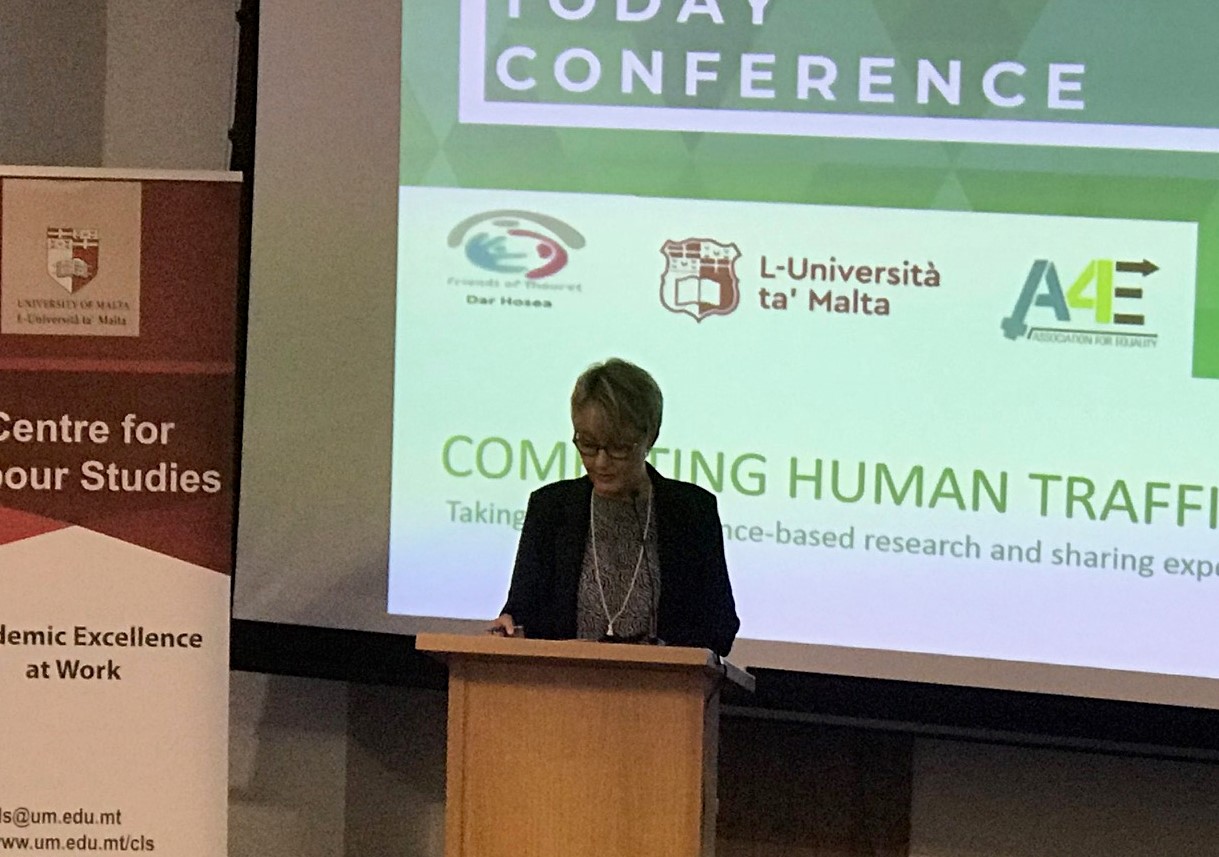 Ms Kaysa Wahlberg – Detective Inspector, Head of the Swedish Police Authority’s Human Trafficking Unit gave a detailed exposition of the Swedish Model. Fundamentally the law prohibits purchase of sex services, by criminalising the pimps and who acquires the service, increased efforts on prevention (legal and educational) to discourage demand.
Ms Kaysa Wahlberg – Detective Inspector, Head of the Swedish Police Authority’s Human Trafficking Unit gave a detailed exposition of the Swedish Model. Fundamentally the law prohibits purchase of sex services, by criminalising the pimps and who acquires the service, increased efforts on prevention (legal and educational) to discourage demand.
Sweden has a long standing position towards gender equality and the protection of women and prostitution is clearly seen as violence against women. Prostitutes have social security exit programs.
Ms Kaysa made an interesting comment when she asked “why is sex work for women and pleasure for men?” There was strong support for the change and the law had a huge impact on the reduction of crime.
Sweden is a moralistic society and this is the perspective the legislators approached their reforms in this sector in 2011. A person acquiring sex services can land himself an imprisonment of 1 one year or a fine that is related to their income. In a particular case the fine even went up to €7,500.
The bill has one single purpose that of discouraging man from paying for sex. The Swedish Approach was restrictive, closing down massage parlours and other places such as brothels and support women. Since 1999 the number of prostitution in streets fell from 60 to 10.
Traffickers and criminal rings see Sweden as a bad market to operate in and prefer countries that legalized or tolerate prostitution. Malta is mentioned as one of these destinations. Police can easily find the places of prostitution, it’s in issue of priorities, asserting “fire the police if they are unable to find them”. The law must not only be enforced but seen to be enforced. Also regular training needs to be given to police and judges. Money needs to be put into implementation, including the police force and not for buying a new fleet of cars, but for training and other related activities.
One will be amased how many police hold wrong perceptions of the problems like “this is an agreement between two, so not the police business or it is women who tempt men, or man need women, they feel unable to prosecute and we had cases of feeling sorry for the Johns.
In Sweden it has been proven that when you reduce prostitution you reduce also other crimes. Also, our experience is that the absolute majority of prostitutes are forced into the activity. Prostitutes are the group at risk and the law gives them the freedom to report to police when they are victim of violence or rape. Therefore, there is no tension between prostitute and police. Police also work with social workers who provide shelter, support and counselling. Social workers also offer support to the man arrested who is also offered support to come out of his behaviour.
The discussion “What model should Malta adopt” moderated by Nana Mallet Cardoza a Swiss lawyer and researcher on trafficking
Ms Harpdeep Walker from the UK National Crime Agency stated that in the UK they refer to individuals as sex workers as they feel this give them dignity. On the other hand they hold pimps as exploiter. The UK made a nation assessment which clearly evidenced an increase in sexual exploitation especially through on line marketing. The Government decided to be more forceful and also increased to life imprisonment people caught in human trafficking.
To prosecute trafficking the victim does not need to testify or prove that she has been coerced by the John. The Unit also monitors online website focusing on sites that create suspicion of human trafficking and exploitation.
Ms Marietheresa Gatt from the Association for Equality spoke at length of the failings of the New Zealand model which went for full decriminalisation in 2013. Government argued that this was necessary to remove the stigma and make prostitution a normal job. This they claimed would control the industry when in effect the opposite happened as it became more prolific. A recent Government review concluded that no only things are as bad as before and but they are actually worse. Demand has increased and this saw the introduction of illegal child trafficking for compete with prostitutes.
Competition caused prices to fall, increased more sex without condoms and prostitutes forced to have sex even when at risk of STDs. The review report found that most children where internally trafficked from the Maori people.
In reality woman still have stigma and woman have not been empowered but further exploited. Also people are not liking the proliferation of brothels with Auckland petitioning to stop such brothels.
In Europe Germany and the Netherlands are also failed models. What has proved to work is the Swedish or Nordic model applied in Norway, Iceland, France, Ireland and recently Israel. The Association for Equality advocates clearly for the adoption of the Nordic Model in Malta.
Mr. Andrew Azzopardi from the Safeguarding of the Children Commission mentioned the need to change mentality through education and praised the YouMe movement. He also questioned what messages are we giving boys when they are growing up through what they see through internet pornography. The message is sex is an entitlement, sexual narcissism where why pleasure is more important than your pain. In the Netherlands child prostitution, since liberalization increased from 5,000 (in 1996) to 15000 in 2001. Mr. Azzopardi concluded that we need firmer punishments for abuse of children and vulnerable women.
Hon Buttigieg Claudette MP Spokesperson for the Opposition stated that dignity of the woman is at the core of the issue and providing a dignified a way out is fundamental. She appealed that the Government works with the Opposition on the issued and hopes that a meeting will soon be set with the Minister.
Ms Kajsa Wahlberg stated that prostitution is always underground even when decriminalised. In Ipswich in 2006 there was a murder of 5 women, who when the man was apprehended it was discovered that he was trusted by prostitutes as he gave the impression he was a decent man. The last prostitution related murder in Sweden was ion 1988.
CONCLUDING MESSAGE BY THE PRESIDENT OF THE REPUBLIC OF MALTA MARIE LOUISE COLIERO PRECA
All victims of sex are women or girls this is modern slavery. EU reports point at organized crimes. Ending human trafficking is a fight against organized crime. We also need to fight poverty which creates this environment and provides the traffickers with supply.
The eradication of poverty is gaining more focus with the context of migration and the G8 has recently spoken on the need of economic equity to end human trafficking. We need more international policies and efforts, we need to act now and build cooperation amongst nations.
The President spoke of the need to explore the models of Sweden, France and Germany and apply these to our national contest. We need to also listen to women that are exploited and eradicate the objectification of women. Let’s rescue and support these women. While there may be diverse opinion on the manner to do this the protection of the vulnerable should be a point of convergence.
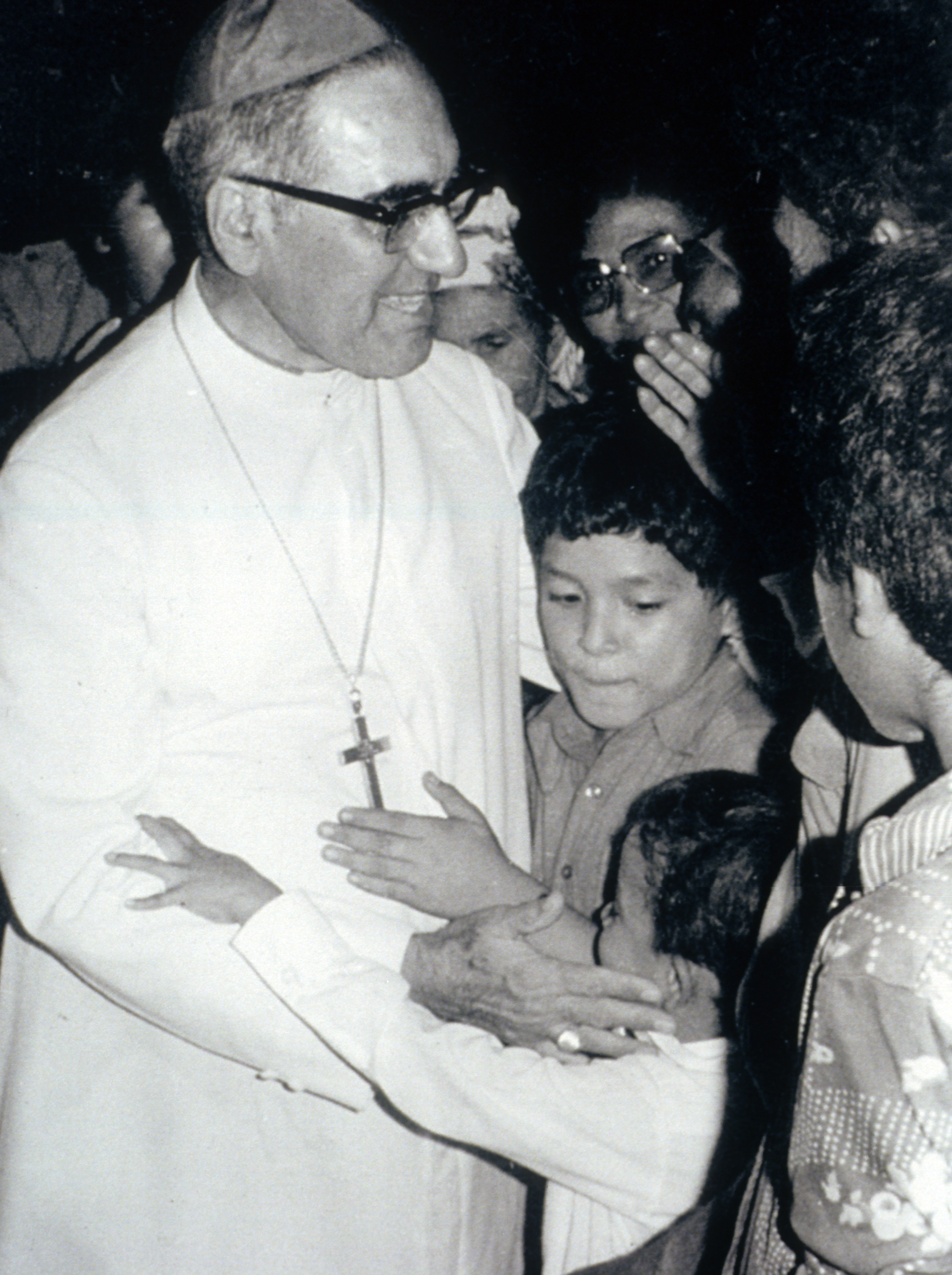 Homily of Archbishiop Óscar Romero on March 24, 1980 during the mass being offered for the first anniversary of the death of Sara Meardi de Pinto, mother of Jorge Pinto, publisher and editor of El Independiente, a small weekly newspaper.
Homily of Archbishiop Óscar Romero on March 24, 1980 during the mass being offered for the first anniversary of the death of Sara Meardi de Pinto, mother of Jorge Pinto, publisher and editor of El Independiente, a small weekly newspaper.
